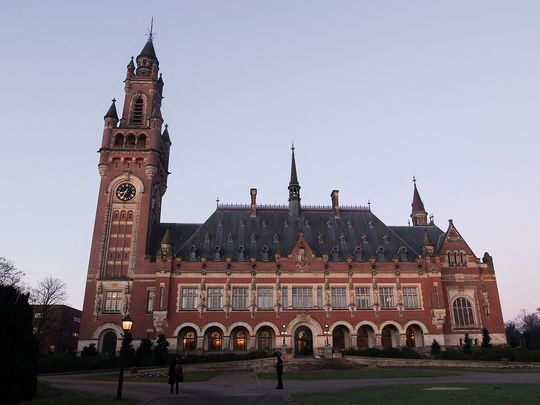
On Jan. 26, 2024, the International Court of Justice (ICJ) made a groundbreaking interim decision, mandating Israel to urgently implement measures to prevent the killing and harm of Palestinians in Gaza.
This ruling, a significant stride in the realm of international law, also obliged the Israeli military to conform to the Genocide Convention, which includes preventing and punishing any incitement to genocide and ensuring the provision of humanitarian aid.
This decision represents a crucial moment in addressing one of the world’s longest and most complex conflicts, which is witnessing mass killings for nearly four months now.
The legal proceedings began on Dec. 29, 2023, when South Africa brought a case against Israel at the ICJ, citing the Convention on the Prevention and Punishment of the Crime of Genocide. This was in response to allegations of genocide against Palestinians following attacks by Hamas on Oct. 7, 2023, which resulted in the deaths of nearly 1,200 people, mostly civilians, in Israel, and the capture of around 240 hostages.
ICJ’s ruling truly shines
Hearings for provisional measures requested by South Africa took place in The Hague on Jan. 11 and 12, 2024. South Africa’s extensive 84-page filing accused Israel of engaging in acts and omissions characterised as genocidal, allegedly committed with the intent to destroy the Palestinian population in Gaza as part of a broader ethnic group.
However, the ICJ’s interim ruling did not include the ceasefire that South Africa and others had hoped for, leaving many Palestinians and human rights advocates disappointed. But here’s where the ICJ’s ruling truly shines — it’s not just a band-aid solution.
This decision digs deep, tackling the root causes and systemic issues fuelling the harrowing possibility of genocide. It’s a game-changer, shifting focus from a mere pause in hostilities to a relentless pursuit of long-term accountability.
Asserting its authority in this landmark case, the ICJ underscored the urgent need for action in the face of a chilling risk of genocide. The court set forth a clear mandate for Israel: prevent any inkling of genocide, open the gates for more humanitarian aid, and clamp down on any incitement. But the story doesn’t end there — Israel must now report back to the court in a month, detailing how they’re meeting these critical demands.
While this ruling isn’t the final word on whether Israel has committed genocide, it’s a very important step to stop the situation from spiralling further. Judge Joan Donoghue spotlighted the extreme vulnerability of Gaza’s civilian population and the looming threat of a worsening humanitarian disaster.
Atrocities in Gaza
The ruling has sparked a spectrum of reactions — South Africa hailed it as a monumental win for international law, while Israel, backed by the Biden administration and Britain, fiercely denied the accusations.
Human rights groups across the globe are applauding this decision, underscoring its significance in pressuring Israel and its allies to act against the potential horror of genocide and other atrocities in Gaza.
This ruling is not just another legal document; it is a lifeline for the survival of Palestinians in Gaza, sounding the alarm on the urgent need to prevent genocide. Despite its important nature, questions linger about how this ruling will be enforced, given the ICJ’s limited enforcement powers.
Nevertheless, it stands as a significant legal and political landmark, poised to ramp up international pressure on Israel to overhaul its approach in Gaza.
A clarion call
The ruling’s acknowledgement of the possibility of genocidal acts is a grim reminder of the dire situation in Gaza. It places a hefty legal and moral responsibility on Israel’s shoulders to shift its strategy and ensure the flow of humanitarian aid and the prevention of incitement to genocide. This is not just about legal compliance; it’s a moral crusade to safeguard human life and dignity.
As the world reacts to the ICJ’s decision, it is clear the ruling has struck a chord. Some are cheering it as a defining triumph for international law, while others, including Israel, are staunchly opposing it. The ruling, however, emphasises the need for global cooperation and responsibility in defending human rights and upholding international law.
The ICJ’s decision is a clarion call to the global community to rethink its role in the Israel-Gaza conflict. Nations worldwide are now grappling with the ruling’s implications, especially in terms of their policies, actions, and taking sides in this war. This includes re-evaluating military aid and diplomatic relations to prevent any unintentional support for potential human rights violations.
This ICJ ruling, monumental as it is, is just the starting point. It demands concrete actions from all involved parties. Israel, as instructed, must now report on the steps it’s taking to comply with the court’s orders. The international community needs to hold all parties accountable, ensuring that this ruling becomes a catalyst for genuine change.
At the heart of this ruling lies the humanitarian crisis in Gaza. The decision throws a spotlight on the suffering of the Palestinian people, women and children, who have disproportionately borne the brunt of the conflict. It’s a stark reminder that any resolution must prioritise human rights and humanitarian needs above all.
The ICJ’s ruling, while not a panacea, is a crucial step towards a more just resolution of the Gaza conflict. It highlights the need for a comprehensive approach that addresses both the immediate need for a ceasefire and the underlying issues fuelling the conflict.
As we ponder the future, this ruling should serve as a foundation for a renewed effort towards lasting peace and justice in the region.









